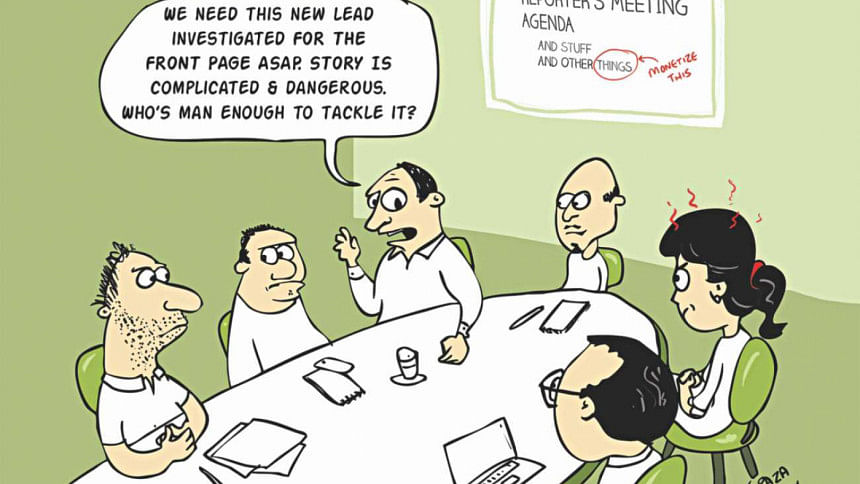Penetrating a men’s club

It was definitely after office hours when a phone call came and made me panic. The number on my screen was unknown but it was pretty easy to guess where the call came from. The law enforcement bodies have a digit sequence that most journalists in the city are trained to recognise.
So, of course, I knew who was calling and – from where. I debated for a moment exactly how useful this man is as a source. A hundred calculations teemed in my head but the phone was going to fall silent at any moment. I gave up and swiped my screen.
What followed afterwards can, at best, be called a patronising conversation. Or you could call it my normal. He giggled throughout. He accused me of forgetting about him. I stayed quiet and took it. Told him to get me a scoop on something I was working on. He told me to visit. For sure, I said, but I do have a colleague I want you to meet so I'll bring him too.
"Him" – a male colleague – because there is no way I'm walking into that meeting alone.
I hated him for making me feel vulnerable; forcing me to take shelter behind a man.
The call ended. I was relieved – it could've been worse. It has been worse. These men, in positions of power, with guns in their belts, have no qualms about calling after 11pm to "get to know me".
Or snap photos on the sly. Or ask me to smile for the camera if I show that I've noticed.
"What's a beautiful woman like you doing unmarried? Don't you want sons?" asked one. I laughed and showed him a picture of my cats. My marital status is the most frequently dissected topic of conversation I have with these men.
"What's this woman doing here?" another shouted. We were in the middle of a police raid in a counterfeit goods factory.
I looked him squarely in the eye. "Journalist," I said, the only journalist to be asked why she's there.
The word 'woman' stung and brought with it a heavy list of hidden meanings. It meant that I, being a walking, talking target for sexual predators, am an added source of nuisance for the men around me who are "responsible" for my protection. It meant that my presence was a ticking bomb and the cops around have one more thing to take care of when maintaining law and order. I could be the best reporter of the lot and still make people ask this question – is it worth the trouble having her here?
The word made me not feel welcome and is probably the reason why there are so few female reporters covering breaking news.
A 2015 study published in the renowned Humanities and Social Sciences journal interviewed a hundred female journalists from Bangladesh and found only one crime reporter in the entire sample set. Seventy-one of them faced sexual harassment and gender discrimination out on the field. There's no denying it – it's a good, old-fashioned men's club.
Anyway, I swallowed my pride, pointed to his boss and said I got called in by the big guy.
Invited by men, hired by men, protected by men. My fierce feminist self chafes that I have to get validation from men to do the job I love.
The list of things I have experienced goes on – from constantly having to justify my presence to the one occasion when a senior journalist placed his cold, clammy hand at the bottom of my spine.
To many of my colleagues and sources, before I am a journalist, I am a sexual being. So, I constantly police my clothes – sleeves, necklines that carefully calculate how many millimeters of skin can be shown, broad scarves that drape over me like a shroud, for I've truly killed who I am to be out with them.
Honestly, though, why just blame Bangladeshi men? Internationally in pop culture and TV plotlines women journalists are always shown to be having affairs with their sources. So why won't perpetrators assume all female reporters trade tricks for tips? Think Zoe Barnes (Kate Mara) in House of Cards, Amy Schumer in Trainwreck, Andy (Anne Hathaway) in The Devil Wears Prada and more infamously, Anastasia Steele (Dakota Johnson) in Fifty Shades of Grey. My taller-than-average height and active gym membership makes me an easy victim of the stereotype.
It took years of being a journalist for me to write this. Female journalists protesting gender discrimination – however few they may be - are seen as whiny, inconvenient. Perpetrators use it as yet another reason why not to allow women in. So the voices stay quiet, unwilling to trade their professions for their dignity. Without a shift in paradigm, dissent will always be limited to the lone article written once in a while.

 For all latest news, follow The Daily Star's Google News channel.
For all latest news, follow The Daily Star's Google News channel. 



Comments